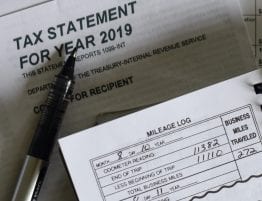
Nobody wants an IRS audit, but there are situations that attract an audit. Most times, when the IRS detects an inaccuracy in a tax return, they send a notice or a letter to seek more information from the taxpayer. The word ‘notice’ may cause some to worry, but the IRS routinely sends notices to taxpayers to provide or ask for information. It is their top way of communicating with taxpayers.
Even if you have clean records, it is still bothersome to prove to the IRS that you have been paying all the taxes owed. Though there’s no guarantee of not being audited, you can avoid doing certain things that are likely to attract an audit. USA Today shares the 7 red flags that can trigger an IRS audit or review.
“Too-high deductions
Certain deductions you take can’t be fudged without raising some eyebrows at the IRS. For instance, the IRS receives information on the mortgage interest you paid, so you can’t inflate that figure. Others — such as charitable contributions — are easier to overstate, since the IRS doesn’t get documentation from charities on your donations. But the agency does use statistical algorithms to make sure the deductions you claim are in line with your total income. If they’re too high, the IRS may request documentation to back up your claims.
Missing income
If you’re tempted to ‘forget’ to include income from a side gig or contract work, don’t. The IRS receives copies of your W-2 and 1099 forms from companies you worked for. It will match the information it has against your tax return. If that data doesn’t line up, your return will be flagged for review.
You have foreign accounts
If you have a foreign financial account — such as a bank account, brokerage or mutual fund — you may need to report it to the IRS when you file your taxes. For single taxpayers, you must file Form 8938 if the total value of your foreign assets is more than $50,000 ($100,000 for joint filers) on the last day of the tax year or more than $75,000 ($150,000 for joint filers) at any point during the tax year. If you fail to do this, you could be fined $10,000. If you don’t file within 90 days after the IRS sends you a notice, you can be assessed an additional $10,000 for each 30-day delay, up to $50,000.
Earning a lot of money
‘Simply earning a lot of money can be a red flag for an audit,’ Allec says.
For instance, the IRS examined 0.5 percent of all individual returns for the 2017 tax year. The examination rate increased to 0.8 percent for non-business filers reporting $200,000 to $999,999 in income, and 4.4 percent for individual returns with $1 million or more in income.
‘Once you cross that $1 million income threshold, your tax return is more complex,’ Allec says. ‘There are more places for the IRS to poke holes in.’
Inflated business expenses
There is much wiggle room when it comes to reporting business income and deductions on Schedule C, so it can be easy to misstate — or inflate — information to your benefit. This is what the IRS looks for:
- Claiming more deductions than profits
- Reporting round numbers for income and expense values
- Reporting a business loss for too many consecutive years
- Writing off 100 percent of an item as a business expense that is often used personally, such as a car or cell phone
The IRS scrutinizes cash businesses, such as taxis, bars, hair salons, and restaurants along with those in the sharing gig economy like Uber or Lyft drivers, says Mark Jaeger, director of tax development at TaxAct, a tax preparation software company.
‘If the IRS has reason to believe you aren’t being truthful, they will start questioning things,’ he says.
Wrongly claiming a child
If you don’t file taxes with your child’s other parent, you both can’t claim the child as a dependent. This also can become confusing if a grandparent or other relative lives with or helps support the child. While this is usually an honest mistake, it could still trigger an IRS review or letter if the same dependent is claimed twice. Generally, the child must be younger than 19 and live with you for more than six months of the year. There are exceptions for older children who are full-time students. For divorced parents, use the ‘tie-breaker rules’ found in IRS Publication 501 to figure out who can claim the child.
Rental losses
There are special rules that allow you to deduct rental real estate losses against your regular income. First, you can deduct up to $25,000 in losses if you actively participate in the renting of your property. That phases out if your income exceeds $100,000 and vanishes when it reaches $150,000.
You can still write off these losses if you are considered a real estate professional — someone who spends more than half of their working time and 750 hours a year in real estate. If claim yourself as a real estate pro, the IRS could take a microscope to your return, Allec says. Make sure to document the hours you spend on your real estate business in case you’re fingered for a review.”
Fill out the form for a free and confidential consultation.








